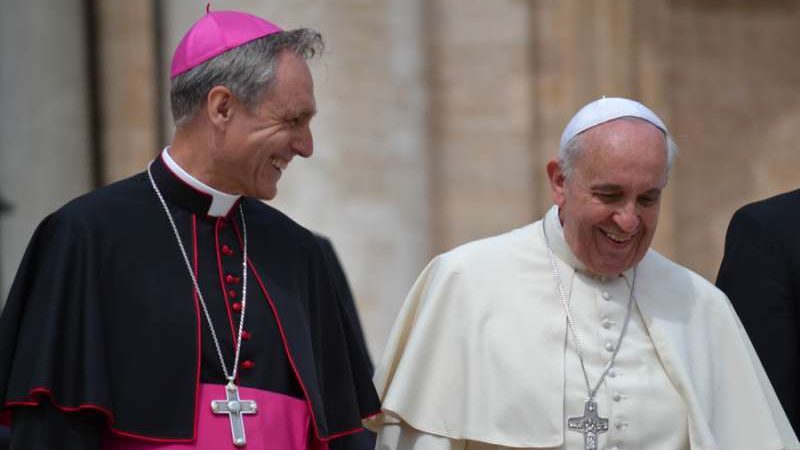Archbishop Georg Ganswein has spent most of the last two decades standing next to the person with the microphone, in his service as an aide to both Pope emeritus Benedict XVI and Pope Francis. But a new book collects the wisdom of Ganswein himself, and aims to call Catholics to evangelization, and to joy.
“If you would like to have three key words, here they are: Evangelization. Testimony. Joy,” Ganswein said of the book, “How the Catholic Church Can Restore Our Culture.”
The book is a collection of interviews, homilies, and essays written and delivered by Ganswein. It was published in English April 15 by EWTN Publishing.
“The Gospel does not change according to the times, it is revealed by Christ if we seek to proclaim and live according to Him ‘in season and out of season,’ in the words of St. Paul,” Ganswein explained in an interview with ACI Stampa, CNA’s Italian-language news partner.
Ganswein, 63, has had a front row seat to the leadership of the universal Church since 2005. In that year, his boss, Cardinal Joseph Ratzinger, became Pope Benedict XVI.
Ganswein was then serving as Ratzinger’s private secretary, and continued in that role as Benedict took up the papacy. He was Benedict’s closest aide, and in 2012 became prefect of the pontifical household, overseeing the clergy and staff closest to the pope. When Francis was elected pope in 2013, Ganswein kept that role, while also continuing to serve as private secretary to the former pope.
But Ganswein’s book does not focus on his Vatican service. Instead, it focuses on a call for Catholics to live faithfully and joyfully in the communion of the Church.
“I wanted to convey that a mere intellectual knowledge of the Sacred Scriptures or the Catholic faith does not bring any fruit. It remains a fruitless knowledge if it is not ‘incarnated’ in our personal life,” the archbishop told ACI Stampa.
“We learn our faith like we learn to swim: not reading a manual, but actually swimming. So the faith becomes flesh, becomes a concrete reality by living it. Once upon a time there was a catechumenate, that is, a time in which people were introduced in a concrete way to the Christian life and doctrine. They would move forward step by step, gradually growing, becoming stronger, and thus, by living the faith, they would discover the beauty of the Christian message. Either faith is lived or is dead.”
The book, the archbishop explained, began with “an invitation from a German publisher to publish some texts of my ‘pastoral’ activity in the last years. I happily accepted and sent the publisher, as you have observed, a collection of conferences, homilies and interviews. From this collection, the expert eye of the editor has chosen the writings published in the present book.”
“Our times require courageous and convincing testimonies. Testimonies are a source of joy, great and strong joy. This is how the Church will have a future! I wanted to remind readers not to forget this simple but fundamental fact,” the archbishop added.

